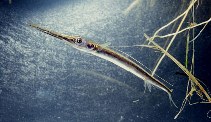| Family: |
Belonidae (Needlefishes) |
| Max. size: |
61 cm TL (male/unsexed) |
| Environment: |
reef-associated; freshwater; brackish; marine; depth range 1 - 3 m |
| Distribution: |
Western Atlantic: southeastern Florida (USA), Bahamas, and northeastern Gulf of Mexico to Brazil. |
| Diagnosis: |
Dorsal soft rays (total): 15-17; Anal soft rays: 16-20. Caudal peduncle without a lateral keel, the least depth about equal to the width; maxilla exposed posteriorly; opercles scaled. |
| Biology: |
Adults found on reef flats, in lagoons, or in freshwater (Ref. 9710). Juveniles found among floating algae (Ref. 9710). Feeds mainly on small fishes (Ref. 3129). Oviparous (Ref. 205). Eggs may be found attached to objects in the water by tendrils on the egg's surface (Ref. 205). During the day preys on small fishes and shrimps close to water surface, approaching potential prey stealthily within lunging range, but when disturbed, may leap and skitter at the surface. At night, young individuals rest close to the surface, aligned with semi-submersed leaves of marsh grass in mangroves, and when disturbed, usually sinks slowly and hides within vegetation. The resemblance to grass blades and its night-time behavior are believed to be defensive adaptations against nocturnal visually oriented predators like night herons (Ref. 40403). |
| IUCN Red List Status: |
Least Concern (LC); Date assessed: 25 August 2018 Ref. (130435)
|
| Threat to humans: |
harmless |
Source and more info: www.fishbase.org. For personal, classroom, and other internal use only. Not for publication.

